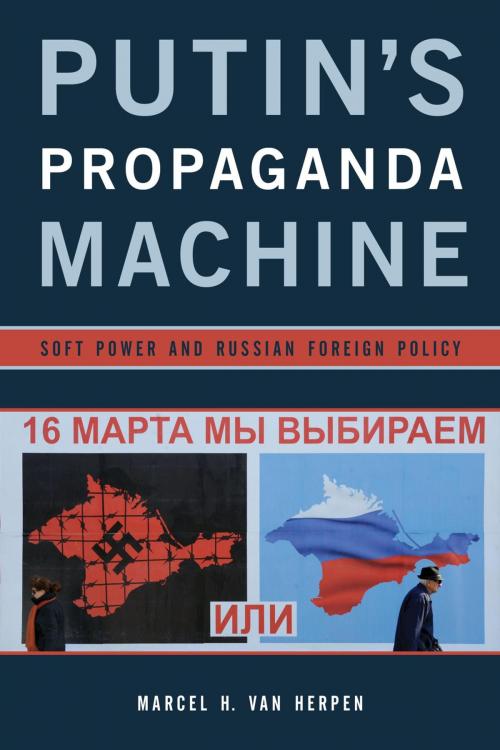Putin's Propaganda Machine
Soft Power and Russian Foreign Policy
Nonfiction, Social & Cultural Studies, Political Science, Government, Public Policy, International| Author: | Marcel H. Van Herpen | ISBN: | 9781442253629 |
| Publisher: | Rowman & Littlefield Publishers | Publication: | October 1, 2015 |
| Imprint: | Rowman & Littlefield Publishers | Language: | English |
| Author: | Marcel H. Van Herpen |
| ISBN: | 9781442253629 |
| Publisher: | Rowman & Littlefield Publishers |
| Publication: | October 1, 2015 |
| Imprint: | Rowman & Littlefield Publishers |
| Language: | English |
Putin's Propaganda Machine examines Russia’s “information war,” one of the most striking features of its intervention in Ukraine. Marcel H. Van Herpen argues that the Kremlin’s propaganda offensive is a carefully prepared strategy, implemented and tested over the last decade. Initially intended as a tool to enhance Russia’s soft power, it quickly developed into one of the main instruments of Russia’s new imperialism, reminiscent of the height of the Cold War. The author describes a multifaceted strategy that makes use of diverse instruments, including mimicking Western public diplomacy initiatives, hiring Western public-relations firms, setting up front organizations, buying Western media outlets, financing political parties, organizing a worldwide propaganda offensive through the Kremlin’s cable network RT, and publishing paid supplements in leading Western newspapers. In this information war, key roles are assigned to the Russian diaspora and the Russian Orthodox Church, the latter focused on spreading so-called traditional values and attacking universal human rights and Western democracy in international fora. Van Herpen demonstrates that the Kremlin’s propaganda machine not only plays a central role in its “hybrid war” in Ukraine, but also has broader international objectives, targeting in particular Europe’s two leading countries—France and Germany—with the goal of forming a geopolitical triangle, consisting of a Moscow-Berlin-Paris axis, intended to roll back the influence of NATO and the United States in Europe. Drawing on years of research, Van Herpen shows how the Kremlin has built an array of soft power instruments and transformed them into effective weapons in a new information war with the West.
Putin's Propaganda Machine examines Russia’s “information war,” one of the most striking features of its intervention in Ukraine. Marcel H. Van Herpen argues that the Kremlin’s propaganda offensive is a carefully prepared strategy, implemented and tested over the last decade. Initially intended as a tool to enhance Russia’s soft power, it quickly developed into one of the main instruments of Russia’s new imperialism, reminiscent of the height of the Cold War. The author describes a multifaceted strategy that makes use of diverse instruments, including mimicking Western public diplomacy initiatives, hiring Western public-relations firms, setting up front organizations, buying Western media outlets, financing political parties, organizing a worldwide propaganda offensive through the Kremlin’s cable network RT, and publishing paid supplements in leading Western newspapers. In this information war, key roles are assigned to the Russian diaspora and the Russian Orthodox Church, the latter focused on spreading so-called traditional values and attacking universal human rights and Western democracy in international fora. Van Herpen demonstrates that the Kremlin’s propaganda machine not only plays a central role in its “hybrid war” in Ukraine, but also has broader international objectives, targeting in particular Europe’s two leading countries—France and Germany—with the goal of forming a geopolitical triangle, consisting of a Moscow-Berlin-Paris axis, intended to roll back the influence of NATO and the United States in Europe. Drawing on years of research, Van Herpen shows how the Kremlin has built an array of soft power instruments and transformed them into effective weapons in a new information war with the West.















